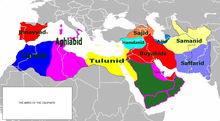Abu Tahir Al-Jannabi
| Abū Tāhir | |||||
|---|---|---|---|---|---|
| Ruler of the Qarmatian State | |||||
 |
|||||
| Reign | 923–944 | ||||
| Coronation | 923 | ||||
| Predecessor | Abū Saʿīd al-Jannābī | ||||
| Successor | Succeeded by his 3 surviving sons and nephews | ||||
| Born | c. 906 Bahrain |
||||
| Died | 944 Bahrain |
||||
| Burial | ???? | ||||
|
|||||
| Dynasty | Qarmatian state | ||||
| Full name | |
|---|---|
| Abū Tāhir al-Jannābī |
Abū Tāhir Sulaymān al-Jannābī (906–944) (Arabic: ابوطاهر سلیمان الجنّابي) was the ruler of the Qarmatian state in Bahrain (historical region) and Eastern Arabia, who in 930 led the sacking of Mecca.
The brother of Abū Saʿīd Hasan ibn Bahrām al-Jannābī, the founder of the Qarmatian state, Abū Tāhir became leader of the state in 923. He immediately began an expansionist phase, raiding Basra that year. He raided Kufa in 927, defeating an Abbasid army in the process, and threatened Baghdad in 928 before pillaging much of Iraq when he could not gain entry to the city.
In 930, he led the Qarmatians' most notorious attack when he pillaged Mecca and desecrated Islam's most sacred sites. Unable to gain entry to the city initially, Abū Tāhir called upon the right of all Muslims to enter the city and gave his oath that he came in peace. Once inside the city walls the Qarmatian army set about massacring the pilgrims, taunting them with verses of the Koran as they did so The bodies of the pilgrims were left to rot in the streets or thrown down the Well of Zamzam. The Kaaba was looted, with Abū Tāhir taking personal possession of the Black Stone and bringing it back to Al-Hasa.
Tāhir Sulaymān's brother Abū Saʿīd was a tribal chief of Banu Janab a branch of Banu Kalb tribe, he had initiated the militarization of the Qarmatians. Abū Saʿīd began preaching against Sunni Islam around 890 after being taught by his mentor Hamdan Qarmat, a native of Syria, from whose name the Qarmatian sect is derived. Tāhir was influenced heavily by his brother and learned to fight early on, along with his followers. Abū Tāhir and Abū Saʿīd started off plundering caravans, traders and Persian pilgrims en route to Mecca before gathering a large following. The brothers soon mobilized an army and set out to lay siege to Basra. However, the governor of Basra learned of their preparations and informed the Abbasid Caliph, al-Muktafi, in Baghdad. The Caliph sent the Persian General Abbas bin Umar to save Basra, but Abbas was defeated and his men executed and the Qarmatian siege was successful in capturing the city.
...
Wikipedia
